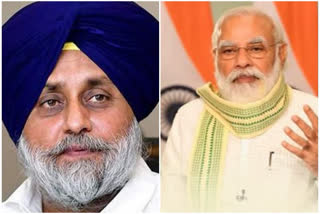Hyderabad: NDA's oldest and the most trusted ally Shiromani Akali Dal has quit NDA on the charges that they were not consulted on crucial Farm Ordinance Bills, which were passed by the Parliament and later approved by the President.
This was followed by the resignation of the Union food processing minister Harsimrat Kaur Badal but that was not convincing enough to satisfy the protesting farmers in Punjab.
Ruling Congress alleged that Harsimrat's resignation was on expected lines but it served no purpose to safeguard the interest of the farming sector.
Punjab chief minister Capt Amarinder Singh and Aam Adami party kept pressure tactics on and challenged Akali Dal to walk out of the alliance if they really cared for the well-being of the farmers.
After day-long deliberations of its Political Affairs Committee (PAC), Akali Dal made the final call. They quit the NDA alliance and snapped the ties with the BJP, a coalition which was assiduously stitched together in 1997 by BJP stalwart Atal Bihari Vajpayee and former Punjab chief minister, Prakash Singh Badal.
MSP matters for Punjab
While the farming bills were passed by the ruling NDA in the parliament, they did not realise what MSP meant for the farmers in Punjab.
In Punjab, good harvest ensures good political dividend, in a way, electoral gains are considered directly proportional to good produce. Farmers in the state always reward the ruling party for ensuring good MSP for their crops.
Punjab has one of the best Mandi systems in the country, where village road are directly linked to the market.
Work for the marketing of agricultural produces started in United Punjab in as early as 1939, when Sir Chotu Ram, as the development minister, got the APMC Act passed, paving the way for setting up of market committees.
Leaders in 1960s and 70s realised that for capital and technology-intensive agriculture, the advance guarantee of high yielding produce was need of the hour. Concept of MSP is not new to Punjab as the MSP for wheat was fixed for the first time in 1966-67 at Rs 54 per quintal, which was later revised to Rs 70 next year.
Farm sector too crucial for political parties
The state election is due in 2022 but Akali Dal can afford to earn the wrath of farmers who are up in arms against the very idea of discontinuing the MSP regime. (Though the Centre has denied that they want to do away with MSP). Punjab's 65 per cent of the population is directly involved with the agricultural activities and ignoring their interest is no easy task.
Just to woo the farmers, the state government gives a power subsidy worth Rs 10,000 crores every year. This issue has become politically so sensitive that no party can advocate against withdrawals of free power now. Now, why all the parties are protesting in against the farm bill is not difficult to understand.
Akali leaders after the PAC meeting said that they were hurt with the slow death of democracy within the BJP as they didn't take their advice on key issues like what would be the fate of farming sector once MSP is rolled back and APMC is unbundled completely.
Former union minister Harsimrat Badal said that she was not consulted on the farm ordinance bill during the cabinet meeting.
